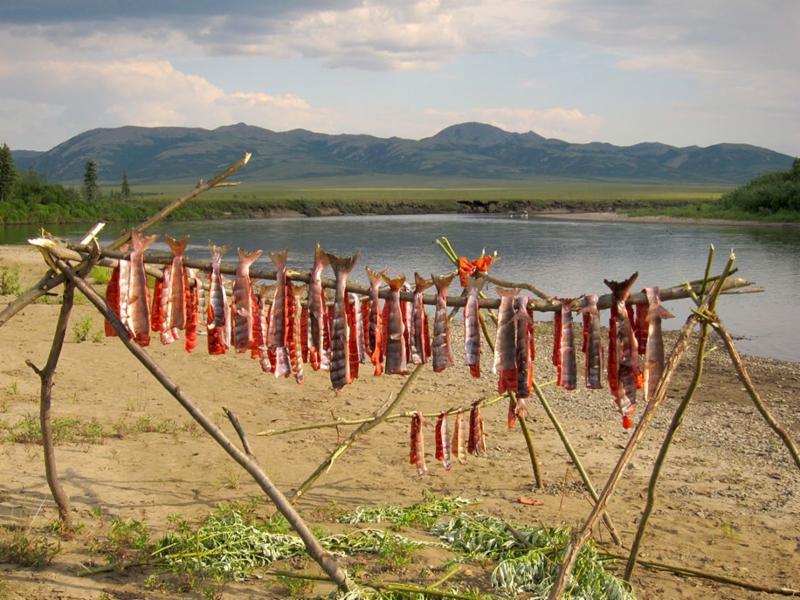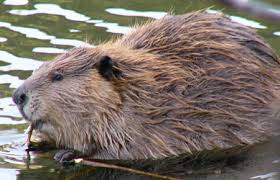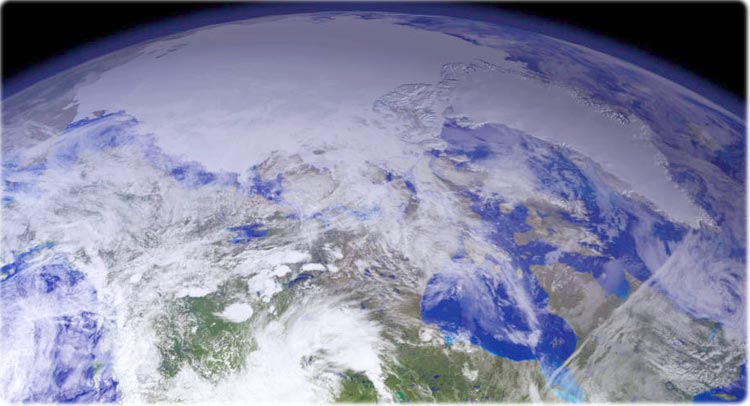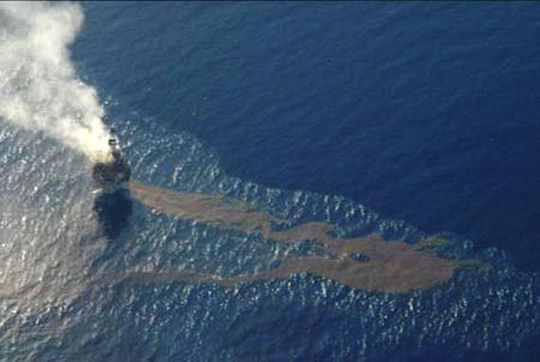|
|
|
|
|
|
|
|
No Arctic-science events are announce for today.
|
Media
 Drying Fish and Having Trouble With Flies? A Local Biologist Wants to Help Drying Fish and Having Trouble With Flies? A Local Biologist Wants to Help. As fishing restrictions push salmon harvests on the Kuskokwim River later into the wet part of summer, families are seeking new ways to dry their fish and keep bugs away. A local fish biologist has a possible solution and is seeking volunteers to test it out.Last summer, stories of spoiled fish traveled along the Kuskokwim River. The rain seemed constant and the flies relentless. Families lost catches from entire fishing openings to rot and maggots. Aaron Moses is a federal fishery biologist at the Yukon Delta National Wildlife Refuge. He saw what was happening and wanted to help. KYUK
 Beavers Are Moving into the Arctic - You Can See it from Space. Beavers Are Moving into the Arctic - You Can See it from Space. The Arctic tundra in Northwest Alaska is being colonized by a new species: beavers. Historical records and previous studies indicated that Alaska's boreal forests were the northern edge of the species. But a new analysis of satellite data shows the animals expanding past the treeline and into the Arctic. Beavers are like little engineers: they alter the shape of streams, rivers and ponds by building dams. Which is a lucky break if you're a scientist with satellite images. Alaska Public Radio
Arctic Floating University Departs from Arkhangelsk. The Arctic Floating University on board the Professor Molchanov scientific vessel began its tenth voyage from Arkhangelsk on Tuesday, July 10. The vessel will go to the White, Barents and Kara Seas; main studies are planned for Novaya Zemlya's north-eastern shore, a TASS correspondent said. The Arctic Floating University is a joint project of the Northern Arctic Federal University (NAFU) and the Northern Department on Hydrometeorology and Environment Monitoring. The voyage participants research Arctic territories in various scientific directions. The voyages feature Russia's leading scientists; students from many universities learn how to work in the Arctic conditions and listen to a big course of lectures. TASS
 Scientists Plan an Expedition to Study Ice Cover in Russian Arctic. Scientists Plan an Expedition to Study Ice Cover in Russian Arctic. Russian scientists will participate in an expedition to the northern seas to study changes in the climate and the ice cover in northern latitudes, the expedition's head, Academician Mikhail Flint told TASS. "A scientific group of 80 scientists, which I shall lead, will take part in a 36-day expedition to Russian northern seas," he said. "The expedition will begin from the port of Arkhangelsk on August 15." TASS
Mapping Climate Corridors. The corridors of land vital for many wildlife species in the face of climate change often are unprotected. Now, a recently published study from a University of Montana ecology professor and other researchers has tracked these shifting North American habitats. Solomon Dobrowski, an associate professor of forest landscape ecology in UM's W.A. Franke College of Forestry & Conservation, was part of a team that used high-performance computing methods to map "climate corridors." Global Change Biology recently published the study. Phys.org
Scientists on Coast Guard Ship May Have Solved a Huge Riddle in Earth's Climate Past. Thirteen thousand years ago, an ice age was ending, the Earth was warming, the oceans were rising. Then something strange happened - the Northern Hemisphere suddenly became much colder, and stayed that way for more than a thousand years. For some time, scientists have been debating how this major climatic event - called the "Younger Dryas" - happened. The question has grown more urgent: Its answer may involve the kind of fast-moving climate event that could occur again. Stars and Stripes
|
|
Future Events
 Coastal Response Research Center Requests Input on the State of Science on Dispersant Use in the Arctic. The Coastal Response Research Center (CRRC) recently collected statements and reports on five topic areas related to dispersant use in the Arctic: efficacy and effectiveness; physical transport and chemical behavior; degradation and fate; eco-toxicity and sublethal impacts; and, public health and food safety. CRRC request written input on the statements the scientists made on the state-of-the-science regarding dispersant use, particularly as it applies to Arctic waters. Written comments are requested by July 13th. More information on this initiative is available here. Coastal Response Research Center Requests Input on the State of Science on Dispersant Use in the Arctic. The Coastal Response Research Center (CRRC) recently collected statements and reports on five topic areas related to dispersant use in the Arctic: efficacy and effectiveness; physical transport and chemical behavior; degradation and fate; eco-toxicity and sublethal impacts; and, public health and food safety. CRRC request written input on the statements the scientists made on the state-of-the-science regarding dispersant use, particularly as it applies to Arctic waters. Written comments are requested by July 13th. More information on this initiative is available here.
17th International Congress of Circumpolar Health (ICCH17), August 12-15, 2018 (Copenhagen, Denmark). The ICCH congresses are held every third year in different locations in the circumpolar area and represent the largest scientific meetings worldwide on circumpolar health. The ICCH congresses serve as the primary source of information exchange and scholarly communication in issues relating to circumpolar health. More than 750 participants generally register and participate in each Congress, and more than 400 scientific papers or posters are usually presented.
UArctic Congress 2018, September 3-7, 2018 (Oulu and Helsinki, Finland). The UArctic Congress 2018 will bring together key UArctic meetings and a science conference into one single gathering, including business meetings of the Council of UArctic, Rectors' Forum, Student Forum, and Thematic Networks & UArctic Institutes Leadership Team. The Congress is an integral part of the Finland's Arctic Council chairmanship program, and open to the public. The event will highlight the themes and priorities of the Finnish chairmanship, including the goals of the United Nations' 2030 Agenda for Sustainable Development, and the Paris Agreement under the UN Framework Convention on Climate Change.
Scientific Exploration of the Arctic and North Pacific (SEA-NorP), September 25-27, 2018 (Mt. Hood, Oregon USA). This workshop will include discussion of hypotheses that can be tested by scientific drilling in the region, the technology necessary to achieve those goals, ideal sites for drilling based on existing data, and where additional site survey data is needed. The goal of the workshop organizers is that multiple proposals will be initiated at the workshop, both for full cruise legs and for shorter, targeted expeditions around the following themes: ocean gateways, geohazards, volatile cycling, ice histories at transition zones, biosphere and climate.
The second Arctic Biodiversity Congress is hosted by the Conservation of Arctic Flora and Fauna (CAFF), the biodiversity working group of the Arctic Council, and the Ministry of the Environment, Finland. The second Arctic Biodiversity Congress will build on the success of the first Congress, held in 2014 in Trondheim, Norway, and will bring together scientists, policymakers government officials, Indigenous representatives, Traditional Knowledge holders, industry, non-governmental organizations, and others to promote the conservation and sustainable use of Arctic biodiversity.
** New this week ** Arctic Circle Assembly, October 2018 (Reykjavik, Iceland). The annual Arctic Circle Assembly is the largest annual international gathering on the Arctic, attended by more than 2000 participants from 60 countries. It is attended by heads of states and governments, ministers, members of parliaments, officials, experts, scientists, entrepreneurs, business leaders, indigenous representatives, environmentalists, students, activists and others from the growing international community of partners and participants interested in the future of the Arctic.
** New this week ** Arctic Science Forum Associated with the 2nd Arctic Science Ministerial, October 25, 2018 (Berlin, Germany and via webcast). How vulnerable and how resilient are nature and the people of the Arctic region? How well do we understand the regional and global dynamics which are driving change in the Arctic? What impact will change in the Arctic have on us? These and other questions are the focus of this two-day conference. It will take interdisciplinary research in the Arctic to gain an understanding of past and future processes - a complex and cost-intensive venture. This makes an international network of Arctic research so important for delivering better results. Cooperation in research, the exchange of data, collaborative observation and monitoring schemes - international cooperation is imperative in research on the Arctic. Only the Science Forum on October 25th will be webcast.
** New this week ** American Geophysical Union Fall meeting, December 10-14, 2018 (Washington, DC USA). The AGU 2018 Fall Meeting will mark another dynamic year of discovery in Earth and space science, serve as the advent of AGU's Centennial year, and provide a special opportunity to share our science with world leaders in Washington, D.C. As the largest Earth and space science gathering in the world, the Fall Meeting places you in the center of a global community of scientists drawn from myriad fields of study whose work protects the health and welfare of people worldwide, spurs innovation, and informs decisions that are critical to the sustainability of the Earth.
** New this week ** Arctic Frontiers, January 20-25, 2019 (Tromso, Norway). The Arctic Frontiers started out in 2006 assembling the first global scientific conference on economic, societal and environmental sustainable growth in the north. In January 2019, the hosts will arrange the 13th conference with the theme "Smart Arctic". The conference has a pan arctic perspective and builds new partnerships across nations, generations and ethnic groups. Arctic Frontiers provides a forum for dialogue and communication between science, government and industry in the Arctic. In 2019, the Arctic Frontiers plenary program will have five main sessions with the following tentative working titles: State of the Arctic, Blue Growth, Smart Solutions, Bridging the gap and Arctic business prospects. Following the plenary, we will organize an abstract driven science program addressing Plastics in the Ocean, the Future of Governance and Handling Vulnerability in Arctic Ecosystems, State of the Arctic and A Smart Arctic Future.
|
|

  
4350 N. Fairfax Drive, Suite 510
Arlington, VA 22203, USA
External links in this publication, and on the USARC's World Wide Web site ( www.arctic.gov) do not constitute endorsement by the US Arctic Research Commission of external Web sites or the information, products or services contained therein. For other than authorized activities, the USARC does not exercise any editorial control over the information you may find at these locations. These links are provided consistent with the stated purpose of this newsletter and the USARC Web site.
|
|
|
|
|
|
|
|
|
 Drying Fish and Having Trouble With Flies? A Local Biologist Wants to Help. As fishing restrictions push salmon harvests on the Kuskokwim River later into the wet part of summer, families are seeking new ways to dry their fish and keep bugs away. A local fish biologist has a possible solution and is seeking volunteers to test it out.Last summer, stories of spoiled fish traveled along the Kuskokwim River. The rain seemed constant and the flies relentless. Families lost catches from entire fishing openings to rot and maggots. Aaron Moses is a federal fishery biologist at the Yukon Delta National Wildlife Refuge. He saw what was happening and wanted to help. KYUK
Drying Fish and Having Trouble With Flies? A Local Biologist Wants to Help. As fishing restrictions push salmon harvests on the Kuskokwim River later into the wet part of summer, families are seeking new ways to dry their fish and keep bugs away. A local fish biologist has a possible solution and is seeking volunteers to test it out.Last summer, stories of spoiled fish traveled along the Kuskokwim River. The rain seemed constant and the flies relentless. Families lost catches from entire fishing openings to rot and maggots. Aaron Moses is a federal fishery biologist at the Yukon Delta National Wildlife Refuge. He saw what was happening and wanted to help. KYUK Beavers Are Moving into the Arctic - You Can See it from Space. The Arctic tundra in Northwest Alaska is being colonized by a new species: beavers. Historical records and previous studies indicated that Alaska's boreal forests were the northern edge of the species. But a new analysis of satellite data shows the animals expanding past the treeline and into the Arctic. Beavers are like little engineers: they alter the shape of streams, rivers and ponds by building dams. Which is a lucky break if you're a scientist with satellite images. Alaska Public Radio
Beavers Are Moving into the Arctic - You Can See it from Space. The Arctic tundra in Northwest Alaska is being colonized by a new species: beavers. Historical records and previous studies indicated that Alaska's boreal forests were the northern edge of the species. But a new analysis of satellite data shows the animals expanding past the treeline and into the Arctic. Beavers are like little engineers: they alter the shape of streams, rivers and ponds by building dams. Which is a lucky break if you're a scientist with satellite images. Alaska Public Radio Scientists Plan an Expedition to Study Ice Cover in Russian Arctic. Russian scientists will participate in an expedition to the northern seas to study changes in the climate and the ice cover in northern latitudes, the expedition's head, Academician Mikhail Flint told TASS. "A scientific group of 80 scientists, which I shall lead, will take part in a 36-day expedition to Russian northern seas," he said. "The expedition will begin from the port of Arkhangelsk on August 15." TASS
Scientists Plan an Expedition to Study Ice Cover in Russian Arctic. Russian scientists will participate in an expedition to the northern seas to study changes in the climate and the ice cover in northern latitudes, the expedition's head, Academician Mikhail Flint told TASS. "A scientific group of 80 scientists, which I shall lead, will take part in a 36-day expedition to Russian northern seas," he said. "The expedition will begin from the port of Arkhangelsk on August 15." TASS

